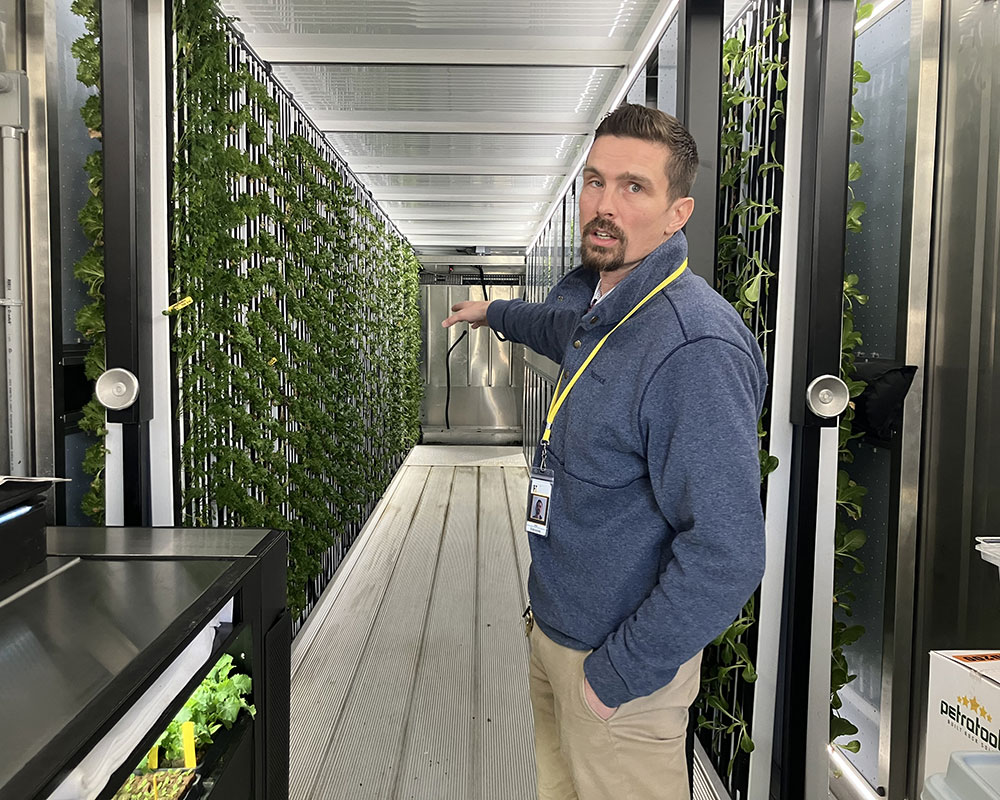(Additional photograph below.)
Since it separated from Haverhill High School in 2022, the alternative school Gateway Academy has moved to the former St. James School and instructs around 130 students, though Principal Brian Edmunds said he expects the number to continue growing.
The School Committee moved the Haverhill Alternative School and Therapeutic Education Assessment Center out of the building in 2019. With the district overcrowded, Superintendent Margaret Marotta called the school underused, serving 80 students in two special education programs when it could house up to 350 mostly middle-school age children. Students from the John C. Tilton School started there that fall.
Now, the leased building once again provides a space for alternative learning after the academy moved from the Crowell School at the beginning of this school year. In 2022, Marotta told WHAV she expected the school to grow beyond the building’s 120-student capacity, and was searching for a three-year-lease for a larger space. Though the year at Crowell was technically the academy’s first, Edmunds said this year also feels like a new beginning because staff have had to adjust to a new layout.
Now at 130 students, Edmunds said he expects to end the year at 150. Though grades eight, nine and 10 are currently full, he said they are still accepting applications for grades seven, 11 and 12. For next year, the school will accept all seventh to 12th grade applicants. Since Gateway opened, the school’s leadership team has accepted 87.9% of students who applied, according to Edmunds. This year, the school has seen a 20% increase in applications.
“We’ll talk with stakeholders, and decide what is ultimately our target roster number. So, I don’t think we’ve fully decided on that yet,” Edmunds said.
Of the obstacles students at Gateway face, he said mental health is one the pandemic exacerbated. The ways students learned during social distancing impacted attendance and disrupted routines, with resources at Haverhill’s middle and high schools often insufficient to help those struggling with conditions like clinical depression.
“A lot of kids are very resilient and are able to bounce back, but a large percentage don’t have the same resilience—to just snap back to the old routines pre-COVID,” he said.
Students come to Gateway with a wide array of experiences, Edmunds emphasized, including “harrowing” journeys immigrating to the United States, losing one or both parents—often to drug-induced overdoses— needing a fresh start after “social conflict” at their previous schools or simply learning differently.
Edmunds said the school’s guiding principles are hands-on learning, trauma-informed care and culturally responsive teaching. The school also has three goals for its students, to be safe, respectful and responsible, with three students at each of the three lunch hours recognized for growth in these areas every Friday.
“We needed to develop an attractive educational experience that would get them in the door,” he said. “And once we got them in a door, we felt like our focus on relationship building and trauma-informed care, which is another one of our big priorities, could keep them here, and really push them to take some academic and social-emotional risks to become something more than they ever thought they could be.”
Not only does the school have in-school counseling, but each student has a care team made up of important adults in a student’s life, which could include neighbors, parents or a former coach. Trauma-informed care also entails creating a comfortable space with a focus on strong relationships. The small size of the school is essential for cultivating such an environment, Edmunds said.
Sometimes, before starting at Gateway, a student will have been out of school for months. Starting with just one block per week and partnering with a strong student, Edmunds said they have the option to ease back in to full-time attendance.
With many students struggling to learn career skills at their previous schools, Edmunds said Gateway champions “learning-by-doing.” The school has a commercial kitchen, a garden and the YMCA Freight Farm. The refurbished cargo container was sponsored by Beth Israel Lahey Health and provides fresh lettuce to the entire school district. Students can also take advantage of paid internships during school hours in areas like healthcare, food preparation and maintenance.
The attendance and grades of one student improved dramatically after starting an internship as a home health aide at Bethany Communities.
“This student, in a lot of ways, has felt inadequate,” Edmunds said. “Maybe teachers didn’t see them as a student who excelled. Maybe other adults just didn’t think that they were as productive as other students. But with this internship, the personnel at Bethany saw instantly that skill at caregiving. It was just natural, it was easy, and really a talent for this student.”
The city has leased St. James School from the Roman Catholic Archdiocese of Boston for 50 years. It previously served as a parochial school.

Gateway Academy Freight Farm Manager Caroline Beaton. (WHAV News photograph.)

